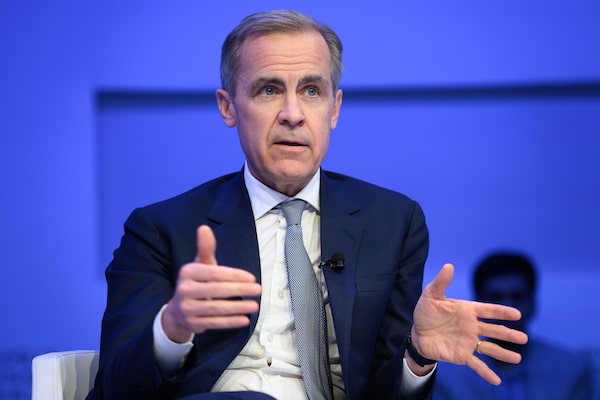
Mark Carney attends a session during the World Economic Forum annual meeting in Davos, on Jan. 21, 2020.FABRICE COFFRINI/AFP/Getty Images
A global alliance of financial institutions aiming for net-zero carbon emissions can still reach its goals even after relaxing its criteria for membership, says Mark Carney, the multitrillion-dollar group’s co-founder.
Banks, insurers and asset managers in the group, known as the Glasgow Financial Alliance for Net Zero, or GFANZ, are now free to pursue their own decarbonization strategies, Mr. Carney said on Thursday, in an interview ahead of this month’s COP27 climate summit in Egypt. That will open up the field to a variety of strategies tailored for each one, he added.
GFANZ originally required member institutions to align their decarbonization plans with Race to Zero, a United Nations climate campaign that called for them to “phase down and out” financing of new fossil fuel assets, and to make no new investments in coal. But GFANZ’s solidarity was threatened earlier this year when large U.S. and Canadian banks began to worry that lockstep divestment in those areas would expose them to antitrust enforcement.
Race to Zero remains a key source of guidance for GFANZ, the group said in a progress report in late October, but strict adherence to its measures is no longer mandatory.
What are the topics to watch at COP27?
Greta Thunberg says COP27 an opportunity for ‘greenwashing, lying and cheating’
Mr. Carney, a former Bank of Canada governor who is now the UN’s special envoy for climate and finance, said GFANZ will be most effective if its members take approaches to decarbonization based on where they operate and how their clients and portfolio companies can best reduce carbon emissions.
The group’s goal is to pursue the Paris Agreement target of limiting global temperature increases to 1.5 degrees above preindustrial levels. That’s what scientists say is necessary to prevent the worst effects of global warming.
“Some will go for carbon-light strategies, if you will – concentrate on industries that don’t have a lot of emissions. Others will go carbon-heavy, go to where the emissions are, and help get those down … We want to get the full benefit of the diversity of the sector,” Mr. Carney said during a video call from London.
“Not every strategy will be successful. That’s true in any aspect of finance. But collectively they’re more likely to be successful if given clear objectives, clear measurement, transparency.”
After banks expressed their antitrust concerns this summer, Race to Zero issued a clarification that removed requirements for common strategies among members. GFANZ has since said its banking, insurance and asset-management subgroups are responsible for managing their own governance, accountability and any changes to membership criteria – essentially removing any requirement to be a Race to Zero signatory. The UN campaign will still provide advice and guidance alongside other bodies, such as the UN Intergovernmental Panel on Climate Change and the International Energy Agency.
Mr. Carney said this change is just one part of the larger evolution of GFANZ, which since last year has added members representing US$20-trillion of assets and expanded in Asia, Africa and Latin America. It has also moved forward with a series of measures its members will use to plan for the transition to a low-carbon economy. And it has begun working with major financial information providers to gather data.
“There is good momentum on this. Where’s there’s tension, it’s the tension we see across the climate issue – which is, the world’s left this very late,” he said. “Significant progress has been made, but not enough.”
Voluntary measures, like those sought by GFANZ, may not be the most effective way for the the finance industry to get to net zero, he said. But he noted that GFANZ was formed because there was no consistent government-mandated climate policy.
Asked if the energy crisis gripping Europe, and rising oil and gas prices elsewhere, will upend global decarbonization efforts, Mr. Carney said those things will actually accelerate the transition.
Russia’s invasion of Ukraine has upset the global energy balance, and Europe faces the likelihood of fuel shortages this winter, pushing countries to seek alternative supplies of oil and gas globally. But Britain and Europe have made ambitious plans to move to cleaner energy in the name of energy security, and the United States has made its largest-ever move in that direction with President Joe Biden’s Inflation Reduction Act, Mr. Carney said.
“What the war in Ukraine has done ... is used up more of the carbon budget. So it’s made it tougher, but it’s accelerated the effort,” he said. “It’s also rammed home that when you have a system that’s been in place for 100 years, and it proves as unreliable as this one has, that maybe you should get a new system.”
 Jeffrey Jones
Jeffrey Jones